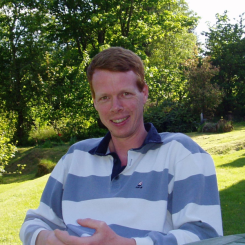 Dr David Mann
Dr David Mann
Imperial College London
Awarded: £119,873
The challenge
Our body has ways of ensuring that our cells divide at the right rate, but cancer cells have multiple ways to escaping this. One way is by producing more proteins which prevent cell death – which makes it harder to kill cancer cells. One of these proteins is called Mcl1. Mcl1 works by stopping other proteins, which trigger cell death, from working. This is true in many cancers and particularly in a range of sarcomas (for example, rhabdomyosarcoma, osteosarcoma, Ewing’s sarcoma and GIST). If you can stop Mcl1 from working, you can ensure cancer cells can die normally.
How will this project tackle this challenge?
Through previous work, Dr Mann and his colleagues have identified pieces of drugs that can attach to Mcl1 – this is an important first step. This project will take this to the next level, turning these pieces into chemicals which behave more like drugs you could use to treat sarcoma in the future.
The chemicals the team are developing attach to Mcl1 irreversibly, so have a very strong effect on sarcoma cells. They predict that you combine these drugs with other treatments, you can effectively and safely kill cancer cells while leaving your healthy cells undamaged.
What this means for people affected by sarcoma
Overcoming cancer cells’ ability to escape death is a big challenge that needs to be tackled in developing new treatments for sarcoma. This project aims to find a new way of doing this, and in the long run hopes to contribute to new treatments for many sarcomas.
Our body has ways of ensuring that our cells divide at the right rate, but cancer cells have multiple ways to escaping this. One way is by producing more proteins which prevent cell death – which makes it harder to kill cancer cells.









